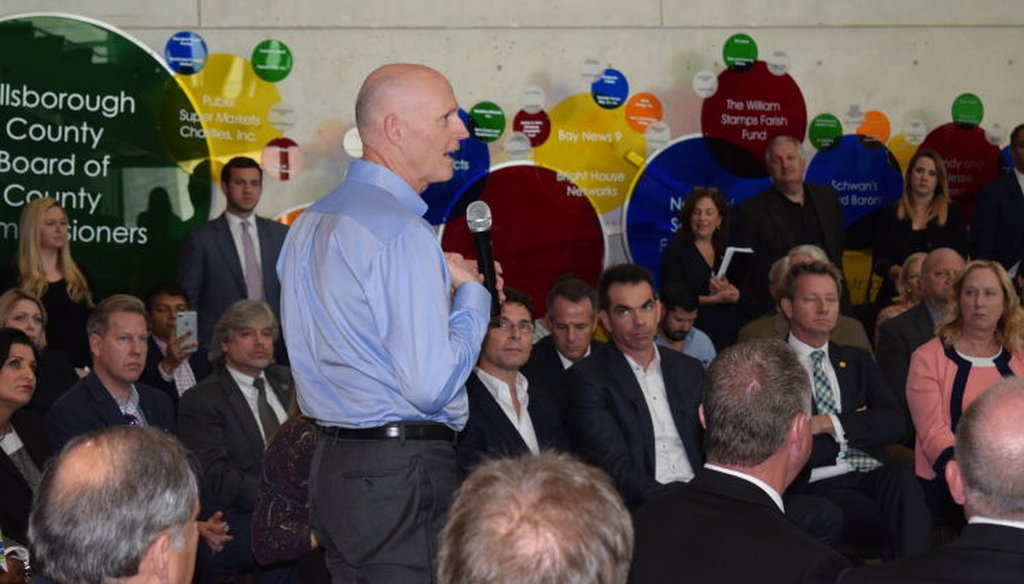Get PolitiFact in your inbox.

Gov. Rick Scott visited the Museum of Science and Industry Feb. 13, 2017 to defend funding Enterprise Florida and Visit Florida. (Photos courtesy of MOSI)
Gov. Rick Scott and House Speaker Richard Corcoran are locked in battle over the future of Enterprise Florida and Visit Florida ahead of the legislative session.
Scott sees the agencies for tourism and business development as essential to his jobs agenda, but Corcoran says they're a waste of money. The House plan would abolish Enterprise Florida and dramatically reduce Visit Florida's spending.
Is the state wasting money? The truth is somewhere in between.
Both leaders have released videos to make their case. Each side misses context and misrepresents the facts.
Failed deals preceded Scott
The first House video focuses on two examples of failed deals: Digital Domain, an animation company, in Port St. Lucie, and Sanford Burnham Medical Research Institute, a California-based life science research organization in Orange County.
The video omits some important context about those projects, launched under Scott’s predecessors.
Enterprise Florida advised against giving money to Digital Domain Florida, which sought money in 2009. The agency concluded that it didn’t meet state criteria, and an agency official later described their financials as "extremely weak."
After that avenue failed, state Rep. Kevin Ambler, R-Tampa, inserted a budget amendment that included the $20 million. Gov. Charlie Crist, the former Republican governor who challenged Scott’s re-election bid as a Democrat, signed off on the budget.
About three years later, the company announced it was closing its Florida operations, filing for bankruptcy and laying off more than 300 employees. After a critical inspector general’s report, the state sued Digital Domain and reached a $5 million settlement in 2016.
Scott pointed the finger back at the Legislature in an op-ed, writing that his tenure has ushered in controls on Enterprise Florida, including a third-party audit to verify job creation.
"Ironically, politicians in the Florida Legislature chose to ignore EFI’s recommendation and circumvented EFI’s strict process in 2009 by funding the failed project from the Legislature," he wrote.
The second project invoked by the House — with Sanford Burnham, recruited to Florida more than a decade ago — spurred a video response from Scott’s political committee.
But Scott’s video also makes an inaccurate claim. The video says that the Sanford Burnham "deal was done in 2006 under Charlie Crist."
Sanford Burnham was recruited when Jeb Bush was governor in 2006.
Scott’s political committee spokeswoman Melissa Stone said the facility opened in 2009 when Crist was governor.
The firm was offered up to $155 million in state funding in exchange for creating 303 jobs over a decade, but it fell about 63 jobs short. On Oct. 28, the state sent a letter to warn Sanford Burnham it was in default and sought about $77 million back.
The firm has said the agreement was to make a "best effort" to create 303 jobs, and indicated that it wants to leave Florida.
The House’s second video scrolls through a list of more than 100 companies that received tax dollars through Enterprise Florida, many names passing too quickly to read.
The text on the video then says: "Florida taxpayers spent $42 million on failed projects. 12 of these projects created 0 jobs."
Once again, some of the agreements were reached under Scott’s predecessors.
We sought information on the 12 projects that the House said created zero jobs. Corcoran’s spokesman Fred Piccolo initially sent PolitiFact Florida a spreadsheet that indicated 31 firms "with no jobs created" but in a telephone interview later narrowed that list to about 20.
Piccolo said that House staff found the projects with zero jobs created in the state’s economic development portal a few days before the video posted on Feb. 17.
Spokespersons for Scott and the state Department of Economic Opportunity largely disagreed with the House list. The officials updated many of the House’s flagged projects in the jobs portal a few days later, blaming a glitch in the jobs portal for showing outdated counts of net jobs when House officials did their search.
Here’s a look at the projects that did not create jobs:
• The firm Actavis, a pharmaceutical company in Broward, reached an agreement with the state in 2013 to produce 220 jobs in exchange for $690,000 in state money. The firm produced zero jobs and — importantly — received no money. The project was terminated.
• Redpine Healthcare Technologies Inc. promised to move its headquarters from Spokane, Wash., to Panama City in 2011 in a deal to create 410 jobs in exchange for about $2 million in state money. The company received $400,000 from the state but never produced any jobs and declared bankruptcy. The state sued and the suit remains open.
• SMI-Owen Steel, a fabricated metal product manufacturing company, reached an agreement with the state in 2001 for a project through 2010. It never produced jobs and never received any state money. The project was terminated.
The House also identified Science Applications International Corporation as a project that produced no jobs, but state officials said that the company name was changed to Leidos and the portal shows that firm created 120 jobs.
In many cases, jobs were created but only a fraction of what was promised. For example, the state reached an agreement with Brinks in 2013 deal to provide 105 jobs in Miami-Dade. As of 2013, the most recent year of data available, 28 jobs were created. The firm got $7,603.13 in state money, with a maximum potential of $210,000.
Scott defends Visit Florida
Scott’s video quotes about a dozen business owners and officials who work for tourism or other agencies who argue that getting rid of the state agencies would lead to job losses.
We interviewed two Flagler Beach business owners who were quoted in the video: Haley Kirk, who owns Vessel Sandwich Company, and Michael Ceribelli, who owns Frankie Alice’s Beachside Boutique.
Both said that they never received money from Visit Florida. The agency included them in a 2016 video in the aftermath of Hurricane Matthew to tell tourists that the restaurants and shops were open for business.
In the video Kirk talked up Visit Florida for "advertising for small businesses that don’t really have the means to pay for that kind of advertising."
One of the other business owners, Rick Case who owns Case Automotive, has given about $16,000 to Scott’s Let’s Get to Work political committee.
Lewis said that none of the businesses quoted in the video received state incentive money.
Our Sources
Florida fiscal portal, Budget 2013-14
Florida House of Representatives, "No more EFI" video, Feb. 15, 2017
Florida House of Representatives, "Enterprise Florida project failures" video, Feb. 15, 2017
Executive office of the Governor Office of the Chief Inspector General, Review of grant to Digital Domain, March 26, 2013
Gov. Rick Scott op-ed, "Florida House is Playing Politics with Families’ Jobs," Feb. 20, 2017
Gov. Rick Scott video, "Fighting for Florida’s future," video, Feb. 21, 2017
Scott for Florida committee, Video, Feb. 22, 2017
Tampa Bay Times, "Did Florida take its eye off promise of biotech?" Nov. 6, 2016
Orlando Sentinel, "UCF medical dean talks to Sanford Burnham's staff," Feb. 8, 2017
Orlando Sentinel, "Faculty decide to leave Lake Nona institute," Jan. 20, 2017
Tampa Tribune, "New state law adds oversight to incentives, watchdogs say," May 18, 2013
Florida Department of Economic Opportunity, Economic Development Portal, Accessed Feb. 10, 2017
Tampa Bay Times, "Jobs in Florida: The Rick Scott record," 2013
Miami Herald, "Recession still has Floridians reeling and anxious about election," Oct. 13, 2016
Tampa Bay Times The Buzz, "Richard Corcoran's offer: Keep Visit Florida, slash budget to $25 million, end bonuses, freeze benefits, cut travel," Feb. 20, 2017
Tampa Bay Times The Buzz, "Ex-Enterprise Florida head says House GOP video misleading," Feb. 17, 2017
Tampa Bay Times The Buzz, "Gov. Rick Scott lashes out at House Speaker Richard Corcoran," Feb. 7, 2017
Tampa Bay Times The Buzz, "Florida House takes first steps toward killing Visit Florida, Enterprise Florida," Feb. 8, 2017
Bradenton Herald, "State economist says 70 percent of Florida's incentive programs are losing money," Jan. 13, 2017
PolitiFact Florida, "Republican Party attacks Charlie Crist for Digital Domain mess and calls it 'de facto Ponzi scheme,'" Oct. 13, 2014
PolitiFact Florida, "Florida House speaker says funding Visit Florida doesn't impact tourism," Feb. 9, 2017
Interview, Fred Piccolo, House Speaker Richard Corcoran spokesman, Feb. 22, 2017
Interview, McKinley P. Lewis, Gov. Rick Scott spokesman, Feb. 22, 2017
Interview, Erin Gillespie, Florida Department of Economic Opportunity spokeswoman, Feb. 23, 2017
Interview, Haley Kirk, owner Vessel Sandwich Company, Feb. 22, 2017
Interview, Michael Ceribelli owner Frankie Alice’s Beachside Boutique, Feb. 22, 2017






































